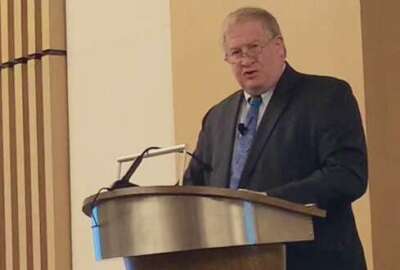 Exclusive
Exclusive Hubbard Radio Washington DC, LLC. All rights reserved. This website is not intended for users located within the European Economic Area.
Hubbard Radio Washington DC, LLC. All rights reserved. This website is not intended for users located within the European Economic Area.
The pace of end-of-fiscal-year spending is off for a variety of reasons. Among them some unresolved policy questions related to national security and the federa...
Best listening experience is on Chrome, Firefox or Safari. Subscribe to Federal Drive’s daily audio interviews on Apple Podcasts or PodcastOne.
The pace of end-of-fiscal-year spending is off for a variety of reasons. Among them some unresolved policy questions related to national security and the federal supply chain. For the industry view, Federal Drive with Tom Temin turned to the president and CEO of the Professional Services Council David Berteau.
Interview transcript:
Tom Temin: David, your members are saying they’re just not seeing the contracts coming through — what’s your observation?
David Berteau: So Tom, as you know, the fourth quarter of any fiscal year is usually the quarter in which the most money is obligated on contracts as well as other other government obligations. A lot of funds, either this year’s funds expire at the end of the fiscal year on September 30, or maybe the two year money from last year is expiring, right. And so there’s always a push towards the end of the year to get the funds out. We don’t have the data, we won’t get the data until the fiscal year is over. But what we’re hearing from a lot of our member companies is that the pace of awards the pace of new awards and the pace of new task orders is a little bit slower than it is typically at this time of year. Obviously, there’s a lot of potential reasons for that. COVID-19 and the pandemic is still around, and that’s certainly impacting things. We also believe I think that some of the slowdowns may be attributed to the requirement now that every contractor who signed the contract has to confirm that they have no prohibited products from Huawei or Hikvision or ZTE or any of the other banned Chinese companies in any of their systems. And while I don’t think a lot of companies have had a great deal of difficulty making that certification, I do think that it is coagulated the contracting process a little bit. Certainly in our conversations with the agencies, we think there are contracts that have been slowed down as a result of that. And it’s not because there isn’t work to be done. I mean, every agency has a ton of work that needs to be done out there. So the government has plenty to do and needs to get on doing it. We’re a little worried about that.
Tom Temin: I wonder if when you hear about all these reports of greater productivity on the part of agencies that’s processing routine work, but planning, and how do we do the future, how do we plan to improve applications or processes? Maybe that kind of work? The difficult stuff that happens in lots of meetings is not happening.
David Berteau: Well when we all started working from home, not all but a large chunk of both the government workforce and the contractor workforce where possible started teleworking back in March, right — there was a sense that people were just as productive remotely as they had been in the office where they could be right. But you have to ask yourself, does that sustain itself over time? How much that is a surge capacity, and can you continue doing this? But I also think that what we didn’t see initially is what are the long term consequences of not being in that collaborative environment. Source selection is certainly one of those things where you do need to collaborate. Source selection evaluation committee or board needs to meet together. They can do it virtually, obviously, but face to face, there’s no substitute for face to face. Nobody’s figured out a virtual app no face to face networking yet. And and that may be that may be part of it. I think another part though is the uncertainty, right. Because we don’t have a appropriations yet for fiscal year 21. Fiscal Year 21 starts in about 21 days. And so that lack of certainty, I think always spills over into programs and contracts. I’m not going to spend all my money now when I’m not sure how much I’m going to have in just three weeks.
Tom Temin: Right. And just getting back to this year’s policy questions, though, before we get into next year. There’s also the 3610 rule which would pay contractors that can’t get to the federal offices where they work. There’s been some scrutiny of that program and whether that has any future to and that’s got to worry contractors.
David Berteau: It does and that authority, as you mentioned, allows the government to reimburse companies for keeping the employees in a paid status when they can’t telework and when they can’t get to the facility where they have to do the work because you don’t want to fire the workers. You’ve spent a lifetime building up this workforce, right. GAO put out a report last week looking at what the data show on the use of Section 3610. And they found that it hadn’t been widely used. But that’s because they were looking only in the official records places. Our data shows that, in fact, dozens of agencies, both civilian agencies and the Defense Department, have used it extensively, but they’re not reporting it in the Federal Procurement Data System because they’re just doing it through the invoices with using available funds. So the focus of the GAO report was both insufficient and inadequate to capture all of the use. Nobody believes that the need for this is going to end on September 30. There will still be a pandemic on October 1. And so it’s absolutely essential that Congress extend that authority, with or without funding. I mean, the funding is important, but it’s not as important as the extension and PSC will be working this very hard for the next three weeks.
Tom Temin: Looking ahead to fiscal 2021, there is no appropriations and pretty much everyone is agreed now that there will be a continuing resolution. But that doesn’t totally resolve the question because there’s the length of the CR. And the longer these things go to the election or to January or to Inauguration Day, whatever they decide makes it harder to do the rest of the year beyond that.
David Berteau: They’re absolutely right. A continuing resolution keeps us going, by definition, it’s essentially you can do next year what you were doing last year, nothing new. You can’t stop anything old, except where there’s an anomaly that allows you to do that. We’ve seen the public reports that a clean continuing resolution could be enacted and put forward. But you’re right, Tom, more than likely it will be for maybe six weeks until it’s say Friday the 13th after the the election, and then you’ll have to have another continuing resolution. If you go back to 2016 on the last presidential election, it was actually almost seven months before we had a full year appropriation in place. And we went through continuing resolution after continuing resolution, that level of uncertainty penetrates the system in such a way that it inhibits not only productive work, but efficient and effective work as well. Contractors and the government both need better than that.
Tom Temin: Any advice for contractors now? I mean, if you can certify, say under 889 that you don’t have this Chinese gear, I guess a lot of contractors are worried that some anomaly when the rules are finalized and the auditing process to go back and see if everyone was truthful could come back to bite them even though they might have been in full compliance in heart and mind and intent, but maybe not technically. So that’s one question. They’ve gotta have a strategy for revenue between now and then.
David Berteau: First of all, companies are still are still bidding and winning work. It’s just the pace is a little bit slower than what we’ve seen, right. And so it is if anybody’s on an going out of business curve, and there’s a lot of work leftover as well from previous existences, so this is really new awards that are being slowed up as a result of this. I don’t get the sense that the slow up is because companies can’t certify. I get the sense that the slow up is contracting officers are going a little bit slower. This is new to them, they got to make sure that they’re following it correctly. Not every agency has issued guidance, right. And the Federal Acquisition Regulation rule itself is not self implementing. It’s 15 pages long in the Federal Register, which is a lot of dense material. Contracting officers almost always want to know, how can I do this in such a way that it’s done well and safely and will rebound and get me in trouble down the road? So I don’t think it’s a long term problem. But I do think in fact we’re concerned about this. The bigger concern, though, is in fact the inability of Congress to reach agreement on fiscal year 21 appropriations and to move that forward. One of the things we’ve seen is that getting a full year appropriations on time dramatically improves the government’s efficiency. Unfortunately, this October we won’t see that.
Tom Temin: David Berteau is president and CEO of the Professional Services Council. As always, thanks so much.
David Berteau: Thank you and I look forward to meeting with you in the next fiscal year and having all of this be fixed.
Copyright © 2024 Federal News Network. All rights reserved. This website is not intended for users located within the European Economic Area.
Tom Temin is host of the Federal Drive and has been providing insight on federal technology and management issues for more than 30 years.
Follow @tteminWFED

